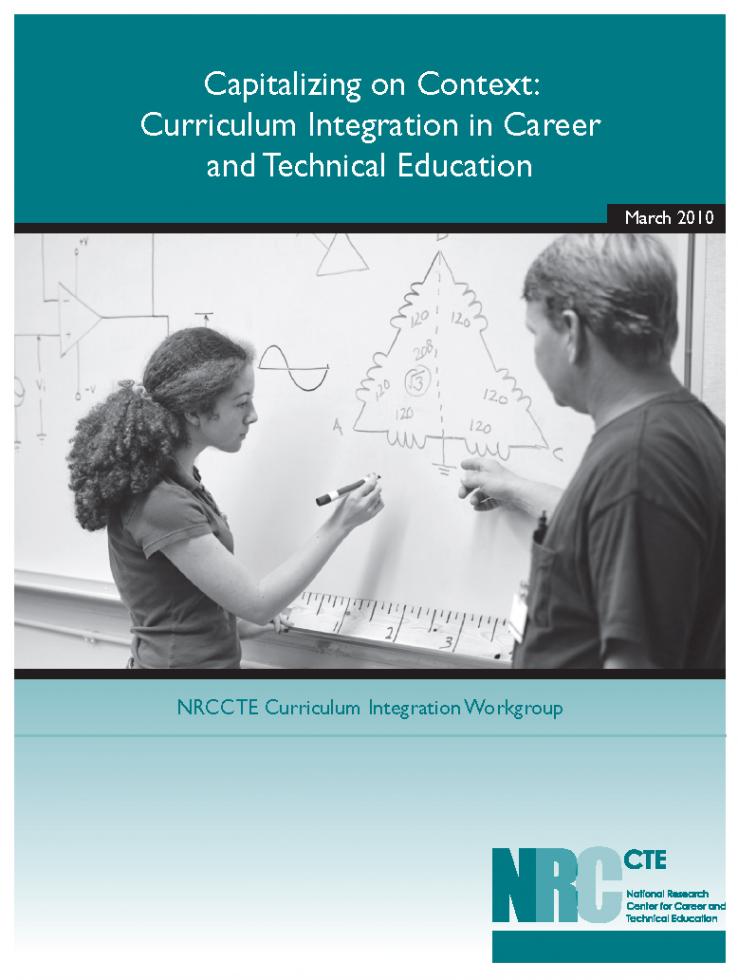Capitalizing on Context: Curriculum Integration in Career and Technical Education
 The Math-in-CTE study began as a
pilot in the spring semester of 2004; the full-year study spanned
the 2004-2005 academic year. Volunteer teachers assigned to the
experimental groups worked with math teacher partners to examine
the CTE curricula and develop math-enhanced CTE lessons. The
experimental CTE teachers implemented the math-enhanced lessons
in their classrooms, while the control group teachers taught
their courses without changing their curricula. After one year of
learning math-enhanced lessons, students in the experimental
classrooms performed significantly better on two of the three
standardized measures of math achievement. This result was
accomplished without reducing students’ occupational knowledge
and skills.
The Math-in-CTE study began as a
pilot in the spring semester of 2004; the full-year study spanned
the 2004-2005 academic year. Volunteer teachers assigned to the
experimental groups worked with math teacher partners to examine
the CTE curricula and develop math-enhanced CTE lessons. The
experimental CTE teachers implemented the math-enhanced lessons
in their classrooms, while the control group teachers taught
their courses without changing their curricula. After one year of
learning math-enhanced lessons, students in the experimental
classrooms performed significantly better on two of the three
standardized measures of math achievement. This result was
accomplished without reducing students’ occupational knowledge
and skills.
The improved math achievement of students was attributed to (a) the pedagogic framework that ensured the transfer of learning and (b) an extended process of professional development that provided an environment that encouraged the emergence of communities of practice. The study revealed five core principles essential to successful integration:
1. Develop and sustain a community of practice among the
teachers.
2. Begin with the CTE curriculum and not the academic
curriculum.
3. Understand that academics are essential workplace knowledge
and skills.
4. Maximize the academics in the CTE curriculum.
5. Recognize that CTE teachers are teachers of academics-in-CTE,
and not academic teachers.
The creation of the NRCCTE’s Math-in-CTE technical assistance project provided a means through which to broadly implement this tested approach. Math-in-CTE technical assistance strives to maintain consistency and accuracy in the implementation of the tested model in new and different settings; measures are taken to ensure that implementations will result in students’ improved math abilities. Evaluation data collected from the technical assistance sites support the core principles revealed in the study.
The purpose of the Authentic Literacy in CTE pilot study was to determine the impact of disciplinary literacy strategies on the reading comprehension, vocabulary development, and motivation to read for students enrolled in CTE courses. Using an experimental design, the researchers randomly assigned teachers to one of three groups: a control condition and two models of content-area reading interventions. Researchers compared the effects of literacy strategy instruction on the aforementioned measures of student achievement. During the half-year pilot study, researchers refined and tested existing reading models and instructional strategies to improve reading comprehension of all CTE students, even those who struggle with reading for content knowledge and solving problems. Researchers conducted student focus group sessions and teacher interviews in addition to the experimental pilot study.
Reading strategy instruction produced a statistically significant impact on reading comprehension and vocabulary learning but did not impact students’ motivation to read. Analysis of teacher interviews yielded six main themes related to creating opportunities for successful strategy use in CTE courses: developing teacher confidence, building communities of practice related to literacy, utilizing authentic text in CTE courses, providing professional development in literacy strategies, making strategy adjustments to meet the needs of CTE fields, achieving framework adoption, and experiencing student receptiveness. Through student focus groups, researchers found four main themes that defined the findings: students desired a utility value in their strategy use; students understood the importance of reading to their career; students engaged in reading if they could apply the information; and students desired a social aspect to reading to foster motivation.
Findings from the Authentic Literacy pilot project supported the core principles from the Math-in-CTE project. In schools in which a critical mass of teachers within the same group were participating in the pilot study, communities of practice grew organically. Other teachers indicated that they sought interactions with their peers regarding literacy and wanted feedback on their ideas for implementing the literacy frameworks; these teachers sought communities of practice. From the outset, all professional development began with the CTE curriculum. All teachers involved in the pilot study realized and affirmed that reading and writing skills and knowledge are essential to developing competent leaders in all CTE fields. Through the professional development, teachers determined where they could maximize the authentic literacy applications in their CTE curriculum. Finally, during the professional development, facilitators disabused teachers of the notion that they were expected to be English teachers. Realizing this, CTE teachers implemented the literacy frameworks into their curriculum in an authentic, purposeful, and explicit manner.
A full-year test of the Authentic Literacy in CTE model will conclude in the summer of 2010. The Science-in-CTE pilot study will conclude in the summer of 2010; a full-year test of the model is proposed for 2010-2011.
NRCCTE Curriculum Integration Workgroup. (2010, March). Capitalizing on context: Curriculum integration in career and technical education. Louisville, KY: National Research Center for Career and Technical Education, University of Louisville.

